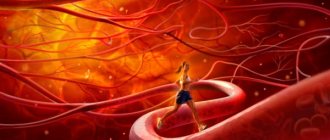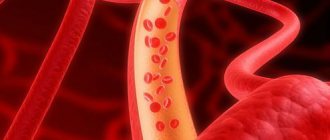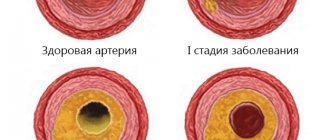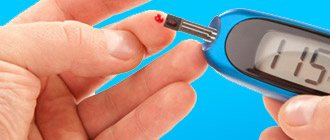Many people suffer from cerebral atherosclerosis, and although on average it manifests itself in people over 50 years of age, there are cases of earlier disease. During illness, the lumen of blood vessels decreases, filling with fatty plaques. As a rule, doctors prescribe diet No. 10, which prohibits the consumption of coffee, but coffee lovers often cannot give it up. So, let’s understand the benefits and harms of coffee for cerebral atherosclerosis, who really shouldn’t have it, and who can, and which ones.
The effect of coffee on brain vessels
In the first stages of the disease, with degrees I and II of atherosclerosis, a person may often experience a state of weakness and dizziness, and in this case, weak coffee will help to cheer up. 1-2 cups per day is acceptable if there are no other health problems.
It is strictly forbidden to drink coffee if you have atherosclerosis:
- If you are diagnosed with hypertension;
- If atherosclerosis has progressed to stage III or IV;
- If you have already had a heart attack or stroke.
How does coffee affect the body during illness?
It is no secret that for some people one cup of coffee causes palpitations, irregular pulses and even pain in the heart area; for others, coffee can cause increased nervous excitability and insomnia, and there are also those for whom coffee causes drowsiness. In any case, people suffering from insomnia should abstain from coffee 6 hours before bedtime.
Coffee is a tonic drink; when drinking it, a person receives a very small dose of tonic medicine. A cup of coffee drunk in the morning refreshes, invigorates, and increases productivity. Experience has established that after drinking two cups of coffee (more than 200 mg of caffeine), a typist types faster and makes fewer mistakes, and vehicle drivers have a faster reaction to braking, increased attention, etc. But drinking coffee does not help drunk drivers at all.
Even though coffee and tea contain almost the same amount of caffeine, most people react more sensitively to coffee than to tea. This is explained by the fact that tea leaves contain a significant amount of tannin and adeine, which largely neutralize the effect of caffeine.
As already noted, caffeine is an alkaloid. It has a dual effect on the body: in small doses it tones, in large doses it depresses. In order for coffee to have tonic properties, you need from 0.1 to 0.27 g of caffeine per dose. Pharmacologists consider a dose of caffeine above 0.25 g to be too high. This dose corresponds to approximately one to two teaspoons of ground natural coffee per glass of water.
The effect of caffeine on the body was once studied by the great Russian physiologist I. P. Pavlov. His works reflect that it is important to take into account not only the dose of caffeine, but also the nature of the reaction of the nervous system of a given person.
Sleep in humans occurs as a result of inhibition of cells in the cerebral cortex. Caffeine weakens this process. That's why coffee in the morning helps to quickly drive away sleep. And an extra cup of coffee drunk late at night can cause insomnia.
Canadian doctor R. B. Har reported that in a number of cases he prescribed strong coffee to elderly people before bed as a remedy for insomnia. The question arises why coffee improves sleep in some people and is a tranquilizer, although usually the opposite is true: coffee drunk before bed disrupts sleep. It turned out that a person with low blood pressure sleeps well after drinking coffee, since the drink has a positive effect on the nervous system, bringing blood pressure to normal levels.
Coffee is contraindicated for hypertension and atherosclerosis.
Coffee increases intraocular pressure, so it is also contraindicated for patients with glaucoma. For medical reasons, coffee is sometimes prescribed to children who are particularly absent-minded and who suffer from bedwetting. In general, children are not given coffee.
As a rule, doctors recommend that older people gradually wean themselves off coffee and drink decaffeinated drinks instead.
With regular consumption of coffee by pregnant women, fetal weight decreases. The causes and consequences of this phenomenon have not been fully studied, so it is better to avoid coffee during pregnancy. For a nursing mother, coffee can reduce the amount of milk produced, so drinking coffee while breastfeeding is also not recommended.
Coffee is a mild stimulant. The excitement caused by it increases gradually and is very stable. The stimulating effect of coffee lasts up to 3 hours. It should be noted that after the excitement caused by coffee, a depressed state does not occur, as is the case with the consumption of alcoholic beverages.
It should be remembered that caffeine is not contained in coffee in pure form, but in a certain ratio with a large group of other organic substances. Therefore, the body's reaction to coffee is different than when taking pure caffeine.
Combining coffee with milk can cause digestive problems in some people due to the formation of insoluble casein tanate in the acidic environment of the stomach. On the other hand, adding milk and sugar to coffee slows down the absorption of caffeine and its effect occurs later.
Coffee has a certain effect on the digestive organs. Here, it is mainly the organic acids contained in coffee that make themselves felt. As a result of their action, the secretion of gastric juice increases and about half an hour after drinking coffee, the acidity reaches its maximum. This speeds up the digestion process and food is better absorbed. This is associated with the tradition of serving coffee for dessert. However, the increase in acidity that occurs after drinking coffee is the reason for the ban on this drink for those who suffer from gastritis with high acidity, gastric ulcer or duodenal ulcer. It should be noted that in some people, an increase in the secretion of gastric juice is accompanied by a burning sensation in the esophagus, and sometimes the urge to vomit.
Along with its stimulating effect on gastric secretion, coffee also has a stimulating effect on intestinal activity. Increased intestinal motility becomes more pronounced if you drink coffee on an empty stomach, which can cause normal and regular bowel movements. Decaffeinated coffee has a weaker effect on intestinal motility.
It should also be noted the effect that coffee has on the activity of the gallbladder, bile ducts and liver. It has been found that coffee increases the secretion of bile. The increase in bile secretion is due primarily to substances formed during coffee roasting, and to a lesser extent to the action of caffeine and chlorogenic acid.
In the medical literature there are many examples of the harmful effects of coffee, causing various diseases, including myocardial infarction, early atherosclerosis, cancer of the digestive system, bladder cancer, diabetes in the elderly, etc. However, such statements are scientifically unreliable. At the same time, they undoubtedly contributed to the spread of the belief that coffee consumption is an “unhealthy habit.”
A quick review of the latest research from the last quarter of the 20th century on the effects of coffee on the human body indicates that coffee is one of the few stimulants that do not have significant side effects on the cardiovascular system, fat and carbohydrate metabolism, uric acid levels, and activity. liver, gastrointestinal and excretory systems.
Thus, this brief review suggests that there are not many contraindications for drinking coffee, but they do exist. And therefore, when the question arises whether to drink coffee or not, doctors answer, not without reason, that coffee cannot be recommended for everyone. If doubts arise in this regard, you should consult a doctor.
It is known from literary sources that in the 18th century some king decided to finally find out whether coffee was harmful. Just at this time, two twin brothers were sentenced to death. The king commuted the execution to life imprisonment, subject to the following conditions. The brothers were in strict isolation under the supervision of doctors. One of them was given three cups of tea daily, and the other the same amount of coffee. The king did not learn the results of the experiment: he died in battle. The doctors did not satisfy their curiosity when they went to their graves. Only at the age of 83 did one of the brothers die, put on a tea diet. But soon the one who was forced to drink coffee also died. Such is the legend. Without attaching evidentiary value to it, one should, however, pay attention to an interesting detail. Coffee was given to the prisoner regularly in small doses and at certain times. After all, they did not try to overdose the prisoner, as some people do, trying to prolong the stimulating effect of the drink. Coffee has a positive effect only when it is consumed in moderation. For a healthy person, the question is rather how much and when coffee can you drink. It is useful to drink a cup of coffee before work, and it is good to repeat this pleasure after a hearty lunch. But drinking coffee without moderation and at the wrong time will not lead to good things. Quite soon, signs of chronic caffeine poisoning may appear: nervousness, insomnia, headache, palpitations, irregular pulse. Here it is appropriate to recall Balzac, whose abuse of his favorite drink seriously undermined his health. At the end of his life, he writes in one of his letters: “After I returned to black coffee again, the twitching of my eyes resumed. ", and in another letter: "Again, not a line! Even streams of coffee can't excite my brain. »
Doctors cautiously, although quite definitely, advise that coffee in a reasonable amount is beneficial for a healthy person. It does not cause disease in itself, but moderation should be the watchword.
How many cups of coffee can you drink a day without risking your health? If it is Robusta coffee, then it is reasonable to drink 1-2 cups a day, Arabica coffee - 2-3 cups. It is recommended not to teach children to drink coffee from an early age. This can adversely affect their nervous system.
The nutritional value of coffee without sugar is relatively small. A cup of coffee without sugar provides approximately 11 calories, and with added milk and sugar - about 78 calories, so there is no point in giving it up to people who are prone to obesity.
You should not suddenly stop drinking strong coffee or reduce its amount, because in such cases headaches and dyspepsia will appear. This should be done gradually - reducing the usual amount of drink by half a cup per day. You can wean yourself off strong coffee by mixing caffeinated coffee with decaf powder. In addition, you should not drink coffee on an empty stomach for a long time (this blocks brain activity), very hot coffee (this provokes esophageal cancer), and the last cup of “vigor” should be drunk no later than 5-7 hours before bedtime.
Diet for atherosclerosis
DOCTOR BITTERLICH'S RECOMMENDATIONS ON DIET FOR ATHEROSCLEROSIS.
The decision to use the diet is made after testing for cholesterol and blood lipids and visiting a doctor who understands these issues. Bad lipids: LDL, triglycerides. Good lipids: HDL. There is an opinion that 25 percent of patients with atherosclerosis do not have
dyslipidemia (disorders of cholesterol and other lipids) and the following diet is not needed for such patients. However, you cannot always trust the laboratory. In addition, two diet options are now recommended. One of them is softer. It is shown below in the table. In a “soft” diet, “bad” foods are divided into those that are LIMITED and those that are PROHIBITED. Another, more strict, “tough” one - it also prohibits those products that are listed in the “RESTRICTED” column in the table below. Thus, if you have dyslipidemia, then all those foods that are listed in both columns are prohibited - that is, not only in the “PROHIBITED” column, but also in the “RESTRICTED” column. If you have “borderline” lipid levels, “atherosclerotic” heredity, there are signs of atherosclerosis and you do not trust the laboratory or do not have the opportunity to be “checked” regularly, then use a “soft” diet.
"Magic words":
1.
Whole grain
products (buckwheat, corn, oats/oatmeal, whole wheat or rye bread, barley, millet, hulled rice and wild rice, brown rice, sorghum, quinoa, triticale - a hybrid of rye and wheat) - more specifically: wholemeal bread (wallpaper flour),
whole grain
pasta, oatmeal, barley, rye flakes.
2. Products with insoluble dietary fiber
(legumes, fruits, vegetables).
3. Products with viscous and soluble dietary fiber (pectin, B-glucans, etc.) are less useful. 4. Unsaturated
(polyunsaturated and monounsaturated)
fats
- found in vegetable oil (but not in palm or other tropical oils), marine fat fish
“False
magic words”:
As recent research has shown, claims about the benefits of certain foods for the prevention of atherosclerosis are erroneous.
Antioxidants
are beneficial naturally in the foods listed in the table below.
But nutritional supplements and multivitamins with antioxidants for atherosclerosis are not effective, and sometimes even harmful, due to their excessive content in their pure form. Including substances such as selenium, beta-carotene, vitamin E in large doses. Soy and soy protein
are neither healthy nor harmful. Could be a harmless replacement for fatty meat. But sausages and frankfurters, where soy is placed instead of meat, are spoiled by the addition of harmful animal fats.
“Bad words”:
trans fatty acids
(not to be confused with transgenic ones).
They are found in partially hydrogenated fats.
These bad fats raise your bad LDL levels and lower your good HDL levels.
That is, they have a bad effect on both good and bad lipids. They are used in fats and margarines for industrial baking and for frying (including at home). Saturated fatty acids -
found in animal fats (meat, poultry).
These bad fats further increase your bad LDL levels. But they do not have a bad effect on good HDL (do not reduce their level). McDonald's
and so-called fast food restaurants. In fairness, their owners should reduce contributions to the pension fund, since they contribute to a shorter life and a reduction in pension costs.
Erroneous
“bad words”:
transgenic foods (GMOs). For people with the problems that make it necessary to study these recommendations, it does not matter whether their food is obtained using modern genetic technologies. Don't bother yourself with this debatable problem. For a “happy” life, reliable prohibitions on really unhealthy food are quite enough for you.
What kind of coffee is good for atherosclerosis?
According to scientific research, the amount of cafestol in a cup directly depends on how the drink was prepared. The longer the process of preparing natural coffee, the more cafestol goes into the water. That is, you should stop brewing coffee in a cezve (Turkish style) and switch to espresso, since in this case the ground beans in the coffee machine have minimal contact with water.
- Adding additional milk or low-fat cream will help reduce the harm from caffeine and make the drink less strong, so that it can be consumed in the amount of 1-2 cups per day.
- Arabica contains less caffeine than robusta, so you may want to switch to this variety.
- Discover the decaffeinated drink.
- It is advisable not to add sugar, as it affects weight gain.
Some people believe that instant coffee is safer because it doesn't need to be boiled and is low in caffeine. This may be true for elite varieties, but in most cases, what is sold in supermarkets has so many chemicals added (stabilizers, dyes, emulsifiers) that the drink is more likely to do harm than good.
In any case, you need to monitor your condition and measure your cholesterol levels. Do not drink strong coffee, only diluted with water or milk. If your condition worsens after a cup of your favorite drink, you should immediately stop drinking it and switch to decaf or coffee drinks.
Anti-atherosclerotic diet
Atherosclerosis is a chronic disease characterized by thickening and hardening of artery walls. Predisposing factors for the development of atherosclerosis are such features of a person’s lifestyle as smoking, excessive consumption of high-calorie and salty foods, alcohol abuse, physical inactivity, and stress. The risk group for atherosclerosis includes patients with arterial hypertension, hyperlipidemia, diabetes mellitus, obesity with complications such as coronary heart disease, chronic cerebral ischemia, peripheral artery disease, and aortic aneurysm.
In the treatment of atherosclerosis, both drug and non-drug treatment methods are used. In this article we will dwell in detail on the non-drug treatment of atherosclerosis, and in particular on the anti-atherosclerotic diet.
The mandatory complex of non-drug treatment of atherosclerosis, along with limiting smoking, combating physical inactivity and excess weight, necessarily includes a diet.
The amount of calories consumed from food should be such as to maintain the patient’s ideal body weight. To assess body weight, the indicator “body mass index” is used, which is equal to: BMI = weight (kg) / height2 (m). Normal BMI is in the range of 18.5-25 kg/m2.
Considering the importance of nutritional factors in the development of atherosclerosis, correction should begin with a diet that must meet the following requirements:
- The higher the cholesterol level in the blood, the stricter the diet should be
- Recommendations for a healthy and balanced diet should be followed throughout life
- For people without cholesterol levels or atherosclerosis, the daily diet should contain less than 300 mg of cholesterol and more than 25 g of plant fiber. To do this, it is necessary to reduce the consumption of products of animal origin (fatty meats, lard, butter, sour cream, eggs, cheese, sausage, sausages, all offal), fish caviar, shrimp, crab meat, replace animal fat with vegetable fat, increase the consumption of products of plant origin (vegetables, fruits, nuts, legumes) and fish dishes. In the presence of atherosclerosis and cholesterol, the daily intake of dietary cholesterol should be limited to 200 mg (for comparison, one egg contains 200-250 mg of cholesterol)
- For overweight people, it is important to limit calorie intake. Typically, by limiting cholesterol intake, it is possible to reduce plasma cholesterol levels by 10-15%, and by reducing total fat intake from 40 to 30% of the total calorie intake, cholesterol levels can be reduced by another 15-20%.
Conclusions:
- Strong natural coffee is prohibited at any stage of atherosclerosis.
- A drink from a coffee machine is healthier than one prepared in a Turk, since in the latter case more cafestol is released, which affects the amount of cholesterol.
- Arabica is preferred over Robusta.
- Instant coffee is no healthier than natural coffee.
- In stages I and II of the disease, 1-2 cups of weak coffee will not harm; in stages III and IV, it is prohibited.
- If you have hypertension, have had heart attacks or strokes, coffee is prohibited.
What to drink - coffee or chicory, the benefits and harms of coffee, the beneficial properties of chicory
The benefits and harms of coffee
Disputes about the dangers and benefits of coffee
have been going on for more than one year.
Scientists around the world, as often happens, are finding more and more evidence: some about the dangers of coffee, and others about the benefits. Who is right? As in most debates, both of them: coffee can be beneficial or harmful
- it all depends on when, how and how much you drink it. The type of coffee also matters, but first things first.
Already ancient alchemists and doctors knew about the benefits of coffee and used it as a healing agent for various diseases. Back in the 1st millennium AD, the famous Eastern philosopher, alchemist and doctor Ar-Razi (Razes) wrote in his scientific treatises that coffee gives clarity to the mind, cheers the soul, treats eye diseases, prevents scurvy and gout. And in the 17th century, the court physician of the Russian Tsar Alexei Mikhailovich used coffee to relieve headaches and reduce a runny nose. By the way, many modern doctors also consider coffee an excellent remedy for migraines.
Today, coffee for us is just an everyday drink, tonic and stimulating due to the caffeine content in it. When we drink a cup of coffee, we get a small dose of caffeine, become more alert and begin to work more actively. For example, drivers' reactions improve after a cup of coffee, but you should not think that coffee can neutralize alcohol.
Of course, large doses of coffee often depress the psyche. Sometimes doctors even recommend drinking coffee for insomnia - at night. It seems surprising, but this way you can fall asleep faster.
Coffee dilates blood vessels and speeds up the digestion process - which is why it is often served for dessert. For patients with gastritis or stomach ulcers, as well as atherosclerosis, it is better not to drink coffee, but for a healthy person the question is different.
Which coffee is better? How much can you drink and when? Like any product, coffee can be harmful or beneficial. Try, for example, drinking 2-3 liters of milk in one sitting, and what will happen to you? But milk is very healthy.
However, the body of many people still reacts negatively to coffee, and for some, three cups can act like poison. But it happens that people simply cannot, or do not want to do without coffee, and when they smell it, they literally fall into ecstasy. How to be? You can use coffee substitutes, of which quite a few have been invented throughout the history of its use.
The most famous and recognized coffee substitute is chicory.
.
Chicory, beneficial properties of chicory
It grows everywhere: in wastelands, near roads, along river banks. In some European countries, chicory is specially grown and drinks and medicines are prepared from it. The most important part of the plant is its root, which contains the nutrient inulin, proteins, vitamins and sugars.
Chicory decoction is known for its antimicrobial and anti-inflammatory properties, and does not depress the nervous system, but calms it, improves appetite and heart function. In ancient times, chicory was used to treat gastrointestinal disorders, inflammatory eye diseases, and wound healing. Today, chicory is included in some wound-healing and anti-inflammatory drugs. Not long ago it was found that chicory helps diabetics by lowering blood sugar levels.
In today's medicine, chicory remains popular because it really has many medicinal properties. In addition to the properties listed above, it has a diuretic, choleretic and astringent effect, as well as antipyretic and anthelmintic.
How does chicory affect the digestive system? Usually they drink a decoction of the roots - this normalizes the functioning of the pancreas, improves metabolic processes in the liver and accelerates the dissolution of gallstones. In addition, the substance inulin, which chicory contains up to 40%, stimulates the development of beneficial intestinal microflora - and this is the path to strong immunity.
Chicory reduces the risk of developing inflammatory processes in the stomach and intestines, so it is often used not only for the prevention, but also for the treatment of gastrointestinal diseases - ulcers, gastritis, dysbiosis, etc. The effect of chicory on the nervous and cardiovascular systems is also very beneficial. Chicory contains B vitamins, which not only calm the nervous system, but also improve mood, giving us energy and vigor.
In addition, chicory is rich in potassium, so it promotes normal heart function, dilates blood vessels and removes “bad” cholesterol from the blood.
Chicory as a coffee substitute
or simply a food product, very useful for tachycardia, coronary artery disease, atherosclerosis and other similar diseases. Due to the high percentage of iron in chicory, it is also successfully used in the treatment of anemia.
Obesity, like diabetes, also recedes under the influence of chicory. It is for this reason that chicory root is so highly valued in modern medicine. Inulin is a high molecular weight polysaccharide. By reducing blood sugar, it normalizes all metabolic processes, accordingly normalizing body weight.
Surprisingly, chicory is also used in the treatment of certain skin diseases. Decoctions, infusions and alcohol tinctures of chicory root help in the complex treatment of seborrhea, neurodermatitis, eczema and dermatitis, chickenpox, furunculosis, acne and psoriasis.
If you consume chicory regularly, for example, instead of coffee, you can significantly reduce the “reserves” of toxins and waste in your body, remove heavy metals and radioactive substances. Even if you are absolutely healthy, you can add chicory to coffee or tea to improve appetite and digestion and relieve stress.
Can chicory replace coffee?
However, can chicory replace coffee completely? Still, the smell and taste of chicory are completely different. Of course, this drink is very healthy, but for people who want to feel the real taste and smell of coffee, this is a small consolation. Therefore, you can add natural coffee to the chicory drink, about 1/5 part.
For those who are too fixated on the dangers of coffee, it doesn’t hurt to know that many studies by modern scientists, on the contrary, speak in its favor. So, if in case of poisoning you rinse your stomach and then drink a couple of cups of coffee, the absorption of toxins remaining in the stomach into the blood will be significantly reduced, thanks to the tannins contained in coffee.
Smokers who don't drink coffee are twice as likely to get lung cancer than those who drink coffee. If alcohol lovers drink coffee in moderation, this significantly reduces the risk of developing cirrhosis of the liver - a frequent companion to immoderate alcoholic libations.
By drinking just one cup of coffee a day, we get 1/5 of the required daily amount of vitamin P, which is responsible for the health of blood vessels. The list of beneficial properties of coffee could go on and on...
As you can see, coffee, like any other food product, is not evil if it is not abused. In addition, you can choose and drink regular coffee in such a way that the amount of caffeine in it is significantly reduced. The most common varieties of coffee are Robusta and Arabica. Drink Arabica coffee - it has almost 1/3 less caffeine.
How to prepare coffee to reduce the caffeine content while maintaining the aroma and taste? It’s not difficult: you just need to pour boiling water over freshly ground coffee, bring it to a boil and quickly pour it into a cup. So there is always a choice - you just need to not be afraid to try different options.
Gataulina Galina
for women's magazine InFlora.ru
When using or reprinting material, an active link to the women's online magazine InFlora.ru is required
Treatment of aortic atherosclerosis
Treatment of aortic atherosclerosis:
- Diet No. 10. Loss of body weight.
- Statins: lovastatin 20-80 mg/day. up to 2 years.
- ANOS: cholestyramine IV 4-24 g/day. (questran, quantalan); cole-stipol 10.0×2 r/d.
- Nicotinic acid 0.03 g, (|TG). Enduracin 250-2000 mg/day.
- AOX: vit. E; Pycnogenol 0.5×1 r/day.
- Disaggregants: thromboass 0.1x 1 time per day, trental 0.1x3 times per day. Consultation with a cardiac surgeon
- Fibrates: gemfibrozil 0.9-1.2 g/day, 2 times a day daily. Probucol 0.5×2 times a day.
- Phospholipids: Essentiale 2×3 times a day for 1 month. Leticin 1X3 r/d.
- Vasoprotectors: actovegin 1×3 times a day, pycnogenol 0.1×1 times a day.
- Surgical treatment: ILS, EOL, PCVS, liver transplantation, hemosorption.
Active observation for aortic atherosclerosis:
S. Vyalov, A. Epmolov, S. Chorbinskaya, E. Chernienko, T. Vasina, V. Kyznetsov











